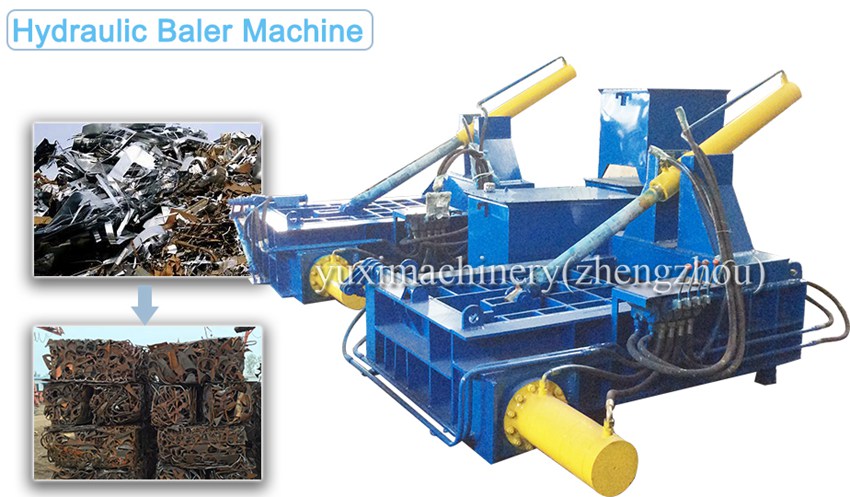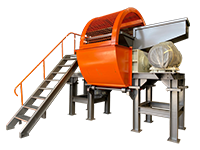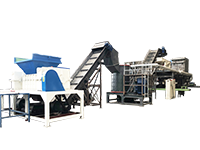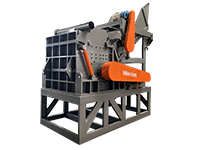In the global scrap metal recycling and processing industry, hydraulic metal balers are core tools for achieving efficient material compression, cost reduction, and efficiency improvement. This article focuses on the technical details, selection difficulties, and application scenarios that industry practitioners care most about, building a complete cognitive system for you from principle to implementation.
1. Technical Core: How Hydraulic Transmission Defines the Upper Limit of Industry Efficiency?
The core competitiveness of hydraulic metal balers comes from the precise design of the hydraulic transmission system:
• Power Unit: A motor that meets NEMA standards is used to drive the hydraulic pump, converting mechanical energy into hydraulic energy; in remote sites, the EPA Tier 4 Final diesel power module can be switched to achieve operation without electricity.
• Actuating Mechanism: The hydraulic cylinder amplifies pressure through Pascal's principle, and the pressing head is made of Hardox 450 wear-resistant material to achieve ton-level compression force on materials such as scrap steel and scrap aluminum.
• Control Logic: The hydraulic valve group accurately regulates the flow direction and pressure of hydraulic oil. Combined with the spherical-connected pusher cylinder/head structure, it ensures the stability of the equipment within a 2000-hour trouble-free operation cycle.

2. Performance Dimensions: 8 Core Advantages Solve Recycling and Processing Pain Points
Aiming at the three major pain points of "large area occupation, high transportation cost, and low efficiency" in scrap metal recycling, hydraulic balers provide professional solutions:
1. Zero-threshold Installation: Foundation-free design + no anchor bolt installation, eliminating civil engineering costs, and completing site deployment within 24 hours.
2. Multi-scenario Discharging Adaptation: Three modes of flipping, pushing, and manual picking, suitable for different operating environments such as scrap steel yards and aluminum can recycling stations.
3. Precise Customization Matching: Equipment size and bale specifications can be customized according to production capacity requirements. For example, when processing scrap steel chips, standard bales with a density of 3.5t/m³ can be customized.
4. Controllable Maintenance Cost: Using SKF oil seals + ISO VG 68 hydraulic oil, regular maintenance every 2000 hours can ensure the service life of the equipment.
5. Noise Compliance: The hydraulic circuit noise is controlled within the OSHA 29 CFR 1910.95 standard, meeting the environmental requirements of factories in North America and the European Union.
3. Application Matrix: Covering Full-category Scrap Metal Processing Scenarios
From metallurgy to recycling, the application value of hydraulic balers runs through the industrial chain:
• Scrap Metal Recycling End: Compress scrap steel, scrap aluminum, end-of-life vehicle materials, etc., reducing storage space by more than 50% and directly reducing transportation costs by 30%.
• Metallurgical Smelting End: The compressed bales are used as charge materials, improving smelting efficiency by 15%-20%, while avoiding the risk of material bridging in the furnace.
• Solid Waste Treatment End: Suitable for lightweight waste such as waste paper and plastics, complying with the ISO 14001 environmental management system, and helping enterprises achieve the compliance goal of "reduction".

4. Decision Manual: 3 Key Questions to Teach You Scientific Selection
1. How to Choose Compression Force?
For processing scrap steel chips, a compression force of ≥2500kN is required to achieve a density of 3.5t/m³; for scrap aluminum can processing, a model with ≥1200kN is sufficient.
2. How to Configure the Power System?
For stable power supply, choose the NEMA standard motor version; for remote mining areas and temporary recycling points, the diesel power module is preferred.
3. Where are the Maintenance Focuses?
Check the hydraulic oil level and cleanliness monthly, and replace ISO VG 68 hydraulic oil every 2000 hours; add Mobil SHC grease to the spherical connection parts weekly.
5. Competitive Barriers: Why Hydraulic Models are the Optimal Solution for the Industry?
Compared with mechanical balers, the advantages of hydraulic models are reflected in:
• Higher Force Density: Under the same power, the compression force of hydraulic machines is 1.5-2 times that of mechanical ones.
• More Precise Action: The stepless speed regulation hydraulic circuit can intelligently adjust the pressing head speed according to the material compression stage.
• Stronger Safety: Overload overflow protection can directly avoid equipment damage caused by foreign object jamming.
Whether you are a decision-maker in a scrap metal recycling enterprise or an equipment manager in a metallurgical factory, mastering the technical logic and application details of hydraulic metal balers will be a key starting point for you to reduce costs, increase efficiency, and build competitive advantages.
 Shredding Machine
Shredding Machine
 Waste Recycling Line
Waste Recycling Line
 Optional Equipment
Optional Equipment


